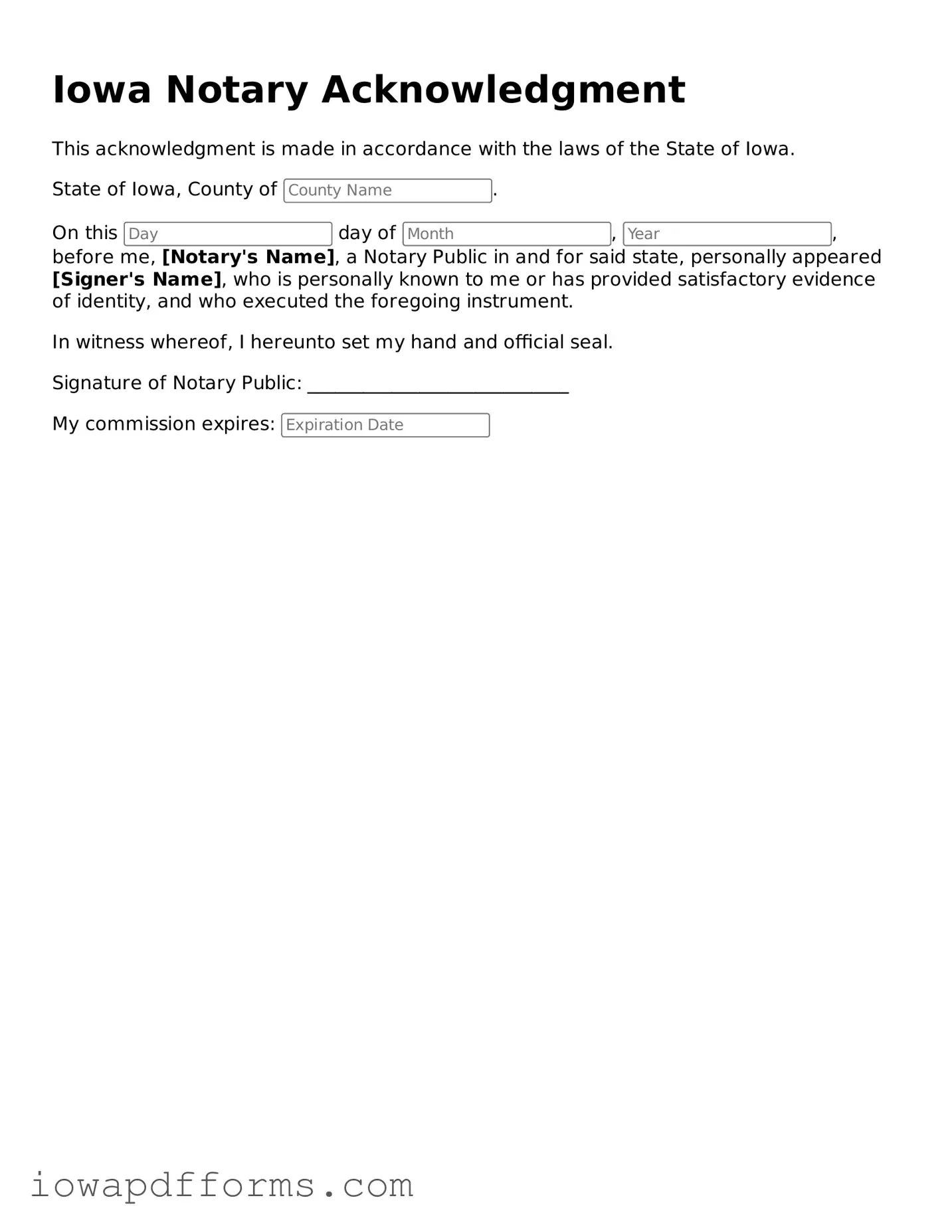The Iowa Notary Acknowledgment form shares similarities with the Affidavit, which is a written statement confirmed by oath or affirmation. Both documents require a notary public to witness the signing process, ensuring the authenticity of the signatures. The Affidavit serves as a means to provide evidence in legal matters, while the Notary Acknowledgment verifies that the signer willingly executed the document in question.
For those engaging in a vehicle transaction, understanding the importance of documentation is key, particularly with the Virginia Motor Vehicle Bill of Sale form. This essential document captures the details of the sale, ensuring all parties are protected and the ownership is officially transferred. To get started on this vital process, you can access the necessary form by visiting https://billofsaleforvehicles.com/editable-virginia-motor-vehicle-bill-of-sale/.
Another document that resembles the Notary Acknowledgment is the Power of Attorney. This legal document grants one person the authority to act on behalf of another. Just like the Notary Acknowledgment, the Power of Attorney requires a notary to confirm the identity of the signer and ensure that they are signing willingly. Both documents help protect individuals by ensuring that the proper procedures are followed during the signing process.
The Deed is another document similar to the Notary Acknowledgment. A Deed is used to transfer ownership of property and must be signed in the presence of a notary. In both cases, the notary's role is to verify the identity of the parties involved and confirm that they understand the implications of their actions. This helps prevent fraud and ensures that property transactions are legally binding.
The Mortgage document also shares characteristics with the Notary Acknowledgment. When someone takes out a mortgage, the lender requires a signed agreement that is notarized. This notarization process is crucial for confirming that the borrower understands the terms of the loan and is entering into the agreement voluntarily. Both documents aim to protect the interests of all parties involved.
Another similar document is the Certification of Trust. This document is used to prove the existence of a trust and the authority of the trustee. Like the Notary Acknowledgment, it requires notarization to confirm the identity of the individuals involved and to ensure that the document is executed properly. This helps to maintain the integrity of the trust and protects the interests of the beneficiaries.
The Bill of Sale is also comparable to the Notary Acknowledgment. A Bill of Sale is a document that transfers ownership of personal property from one person to another. Notarization adds an extra layer of security by confirming the identities of the parties involved and ensuring that the transaction is legitimate. This helps to prevent disputes and provides a clear record of the sale.
Similar to the Notary Acknowledgment is the Release of Liability form. This document is used to protect one party from legal claims made by another. Notarization is often required to confirm that the individual signing the release understands the implications of waiving their rights. Both documents emphasize the importance of informed consent and the need for verification by a notary public.
The Consent to Travel form is another document that bears resemblance to the Notary Acknowledgment. This form is often used when a child is traveling with one parent or a guardian, requiring notarization to confirm that the other parent or legal guardian consents to the travel plans. The notary's role is to ensure that the consent is given voluntarily and that all parties understand the arrangement.
Finally, the Loan Agreement is similar to the Notary Acknowledgment. This document outlines the terms of a loan between a lender and a borrower. Notarization is often required to confirm the identities of both parties and to ensure that they fully understand the agreement they are entering into. Both documents serve to protect the rights and responsibilities of the individuals involved.

